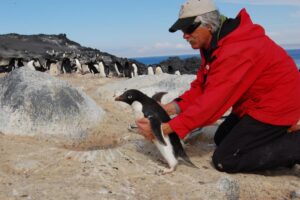 Since 1996, in collaboration with the U.S. Geological Survey (USGS) at Oregon State University and Point Blue Conservation Science, H. T. Harvey & Associates has been engaged in quantifying the demography and population dynamics of Adélie penguins within a four-colony metapopulation on Ross and Beaufort islands, in the Ross Sea, Antarctica. The ultimate aim of our work is to understand the mechanisms behind population size change, whether related to alterations in overwintering survival, emigration, recruitment of prebreeders, the incidence of breeding, or breeding success. Using satellite telemetry, time depth records, radio-frequency identification, automatic weighting, and diet sampling, our team has quantified how penguins meet challenges offered by the environment, in part as a function of competition, as mediated by colony size (colonies ranged from 3000 to 300,000 pairs). Along the way, we have discovered that fewer than 20% of breeders persistently contribute to colony growth. In light of this finding, we launched an investigation of “breeder quality” as perhaps determined by hormone levels, cardiovascular attributes, or experience (we had observed that high-quality breeders were the most efficient foragers).
Since 1996, in collaboration with the U.S. Geological Survey (USGS) at Oregon State University and Point Blue Conservation Science, H. T. Harvey & Associates has been engaged in quantifying the demography and population dynamics of Adélie penguins within a four-colony metapopulation on Ross and Beaufort islands, in the Ross Sea, Antarctica. The ultimate aim of our work is to understand the mechanisms behind population size change, whether related to alterations in overwintering survival, emigration, recruitment of prebreeders, the incidence of breeding, or breeding success. Using satellite telemetry, time depth records, radio-frequency identification, automatic weighting, and diet sampling, our team has quantified how penguins meet challenges offered by the environment, in part as a function of competition, as mediated by colony size (colonies ranged from 3000 to 300,000 pairs). Along the way, we have discovered that fewer than 20% of breeders persistently contribute to colony growth. In light of this finding, we launched an investigation of “breeder quality” as perhaps determined by hormone levels, cardiovascular attributes, or experience (we had observed that high-quality breeders were the most efficient foragers).
The Ross Sea penguin population is not only affected by the changing climate, it is now also affected by industrial fishing, targeting that which is sold as “Chilean sea bass”. Those fish (Antarctic toothfish) and the penguins forage heavily on the same fish prey, Antarctic silverfish. Trying to separate these two factors is currently a focus of our project. We are attempting to quantify prey availability using acoustic sampling on ocean gliders and remotely operated vehicles. The project involves 3.5 months of field work each year, as well as development of an educational website and classroom instructional materials. So far, about 30 scientific papers, two books, a feature-length documentary film, and a TV-broadcast film have been produced using our project results.
Senior Wildlife Ecologist
Principal, Wildlife Ecology
Add your email to our mailing list to receive occasional ecological news from us.
Submit Your Details
